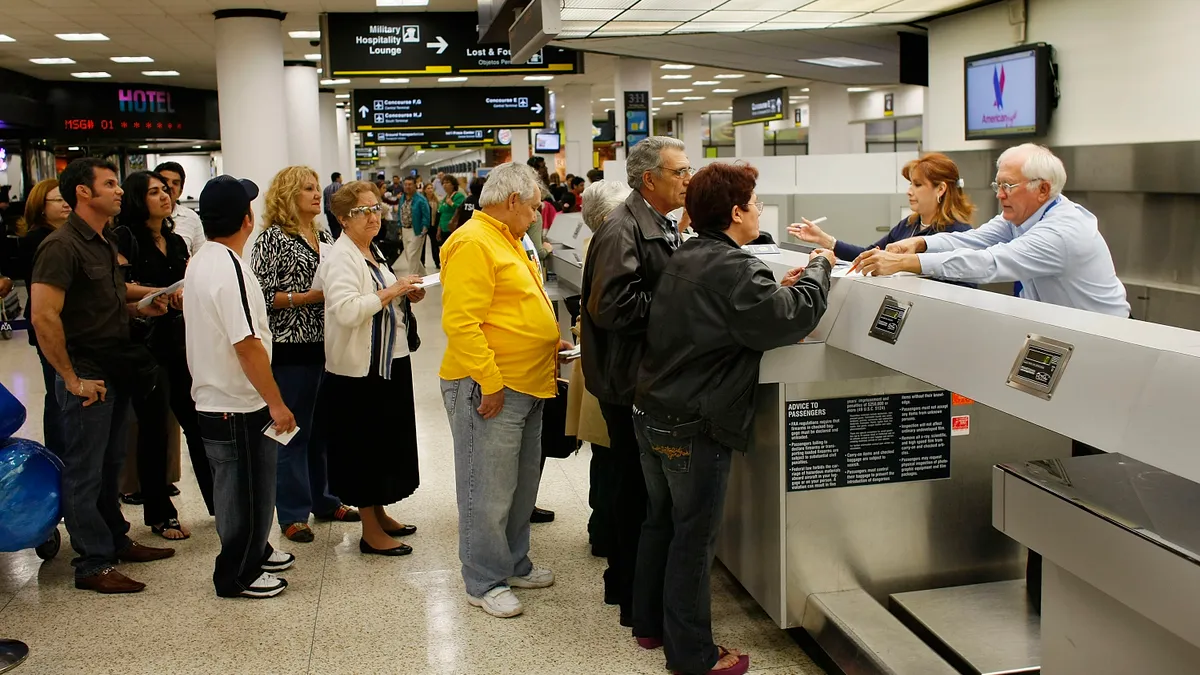Dive Brief:
- A federal rule detailing when and how airlines are to disclose important ancillary fees, like those for checked baggage and flight changes, is a case of regulatory overreach by the Department of Transportation and should be vacated and set aside, an industry coalition says in a May 10 petition filed with the Fifth Circuit Court of Appeals.
- “Petitioners challenge the final rule on grounds that it is contrary to statute – including that it exceeds the department’s authority … and that it is arbitrary, capricious, an abuse of discretion, and otherwise contrary to law,” industry group Airlines for America and half a dozen U.S. airlines say in the lawsuit.
- A final version of the rule was released in April as part of a wider effort by the Biden administration to curb what it considers junk fees by industries. Should it take effect in July as scheduled, the rule will require airlines and ticket agents to provide upfront disclosure of baggage and flight change fees. “This will help consumers avoid unneeded or unexpected fees that can increase quickly and add significant cost to what may, at first, look like a less expensive ticket,” DOT says in a statement.
Dive Insight:
Airlines for America says the airline industry already does a good job disclosing the full cost of a ticket.
“Consumers are well-aware of the existence of ancillary services fees,” the group says in a statement. “Airlines go to great lengths to make their customers knowledgeable about these fees.”
DOT says it’s heard from consumers and consumer advocates that the fees are unclear and often come as a surprise. It estimates airline passengers will save almost $600 million a year if the fees are better disclosed.
“This transfer represents $543 million in overpayment in fees for consumers,” the agency says in the rule's preamble.
Gary Leff, an industry analyst who focuses on frequent flier benefits, says the bulk of the savings that DOT calculates doesn’t come from consumers opting out of fees but from spending less time on websites trying to understand what fees are being charged.
“According to DOT [saving time] is almost the entire source of the savings,” Leff says in his analysis. That amounts to $365 million to $484 million of the $543 million in estimated savings. Meanwhile, the rule will cost airlines up to $331 million to implement, most of that from having to retool their online platforms to accommodate what DOT wants.
DOT “needed to manufacture a consumer benefit larger than the cost of compliance in order to justify the rule,” Leff says, “but they do not even back out the consumer cost of having to wade through extra information, further complicating the process of buying tickets.”
Airlines for America says the added information that DOT wants will end up confusing people. It’s “a bad solution in search of a problem,” the group says.
Regulatory overreach
Separate from whether the rule is a good idea, DOT doesn’t have the authority to issue it, the group says.
Under 49 U.S.C. Sec. 41712, the agency’s statutory authority to go after unfair, deceptive or anti-competitive practices, the agency “may investigate and decide whether an air carrier, foreign air carrier, or ticket agent has been or is engaged in an unfair or deceptive practice or an unfair method of competition.”
It’s more appropriate for DOT to take an enforcement approach and go after instances where it finds an airline or ticket agent acting in an unfair, deceptive or anti-competitive way, not to issue a rule, the trade group says.
DOT says it addressed this suggestion earlier, when it took public input into the rule, and has concluded that it needs the rule before it can pursue companies for potential violations.
“The Department disagrees with the suggestion that it should pursue enforcement action under its unfair and deceptive practices authority, rather than conducting a rulemaking,” the agency says in the rule’s preamble. “The airline representative's suggestion that the Department take enforcement action instead of conducting rulemaking would be difficult if the current regulation permits or does not address the practices that are of concern. The Department issues this regulation to address the inadequacy in the current regulation.”
The carriers joining Airlines for America in the lawsuit are American Airlines, United Airlines, Delta Airlines, Alaska Airlines, Hawaiian Airlines and JetBlue. Rival Southwest, which didn’t join the suit, doesn’t charge for checked bags or premium seat assignments.











